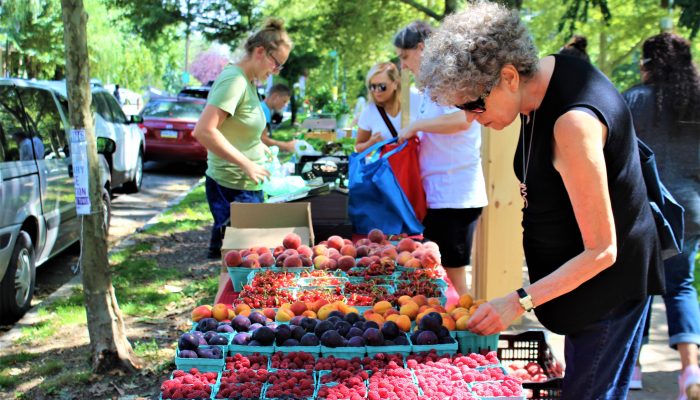Farmers’ markets have been a part of Philadelphia’s food system since at least 1858 when Market Street was home to open-air produce markets. Today, there are more than 30 farmers’ markets and farm stands across the city, which play a vital role in bringing fresh produce to neighborhoods. They connect urban communities to local and rural agriculture; provide access to fresh fruits, vegetables, and other locally-grown products; and support the local and regional farming economy. Many Philadelphia farmers’ markets and farm stands are rooted in urban gardens and farms that are closely tied to their communities and enhance community resilience and well-being.
Food access remains a critical issue for Philadelphians. According to Feeding America, more than 210,000 residents faced food insecurity in 2023, over 13% of the city’s population. The burden of food insecurity is not shared equally: 22% of Black households and 23% of Hispanic households lack regular access to nutritious foods. Additionally, 25% of Philadelphia’s children do not have secure food access at home.
In areas inundated with unhealthy options, farmers’ markets offer a convenient opportunity for fresh, high-quality healthy food that is locally grown and sourced. In addition, most farmers’ markets in Philly offer nutrition assistance programs, with 56% accepting SNAP/ACCESS cards and Philly Foods Bucks. Many locations also accept Senior and WIC Farmers’ Market Nutrition Program vouchers. To find a market that accepts these payment options, use the farmers market finder and filter by payment type.
The Health Department’s Division of Chronic Disease and Injury Prevention (CDIP) is committed to supporting markets in high-need areas, recognizing both the disparities in healthy food access and the benefits farmers’ markets bring to neighbors and farmers.
2025 Farmers’ Market Mini-Grants awarded
To further support farmers’ markets and farm stands across the city, CDIP launched Farmers’ Market Mini-Grants in March 2025. The initiative sought applications from markets and stands located in low-income communities of color with high rates of food insecurity and limited access to healthy food. Fourteen markets were selected to receive $2,000 each to support their efforts in expanding access to healthy food. All applicants, regardless of selection, will also receive free promotional signage from CDIP.
New and improved Farmers’ Market Operator Guide now available
In addition to supporting existing markets, CDIP works with EHS and other partners to provide resources to guide the creation of new markets across Philadelphia and recently updated the Health Department’s Farmers’ Market Operator Guide.
This comprehensive guide advises operators through the process of applying for and managing a farmers’ market in Philadelphia. It includes explanations of City requirements, tools for market operators, and best practices developed in collaboration with the Farmers’ Market Advisory Group, a team with over 30 years of combined experience operating and vending at farmers’ markets.
CDIP also developed a new planning tool to help operators determine what type of location approval their market would need to operate.
CDIP hopes these resources will serve as valuable tools for anyone interested in bringing more local, fresh produce into Philadelphia’s neighborhoods.
For more information on how to operate a farmers’ market or to access the updated Farmers’ Market Operator Guide, visit: www.phila.gov/operate-a-farmers-market.




